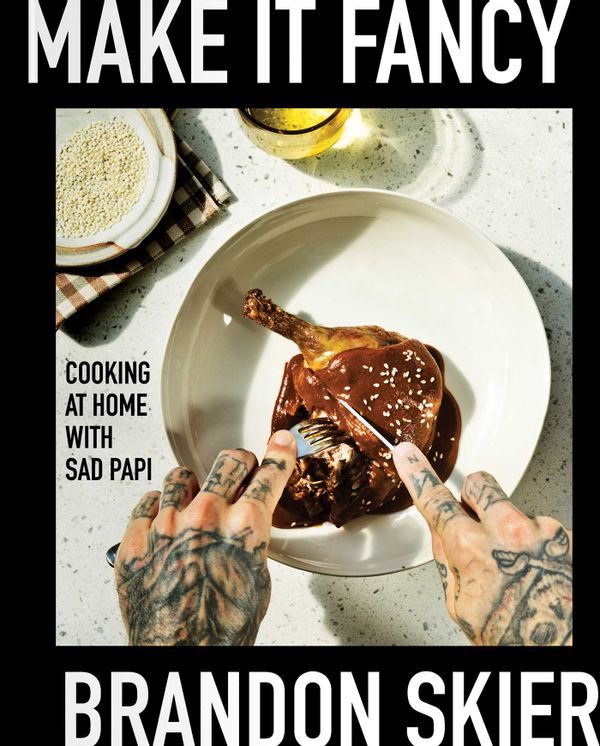
Known as “Sad Papi” on the platform where he has over 2 million followers — and is regarded as something of a culinary darling — Skier has spent the last few years making short videos, with titles like “Dry aging duck” and “Rendering tallow,” that demystify some of the techniques and recipes that underpin fine dining cuisine.
Skier's teaching style straddles a pleasant line between cool mentor and in-the-know friend (“Now, I can’t make you a saucier overnight,” Skier said in his “Sauce 101” tutorial posted last year. “I can give you some tips”), which is a tone that he has carried over into his debut cookbook, “Make it Fancy: Cooking at Home with Sad Papi,” out now from Simon & Schuster.
Now, I’ll be frank, I’m not typically especially enthused when I see something about a “viral TikTok cook” — it’s a realm that sometimes prioritizes virality over actual taste, know-how and technique — but Skier is a notable exception and one quick perusal through his cookbook extinguishes any doubts. Skier's prowess and evident passion for showing all the terrific ways in which a home-cooked meal can be just as satisfying and enriching as a dinner out, or perhaps even more so, helps elevate "Make it Fancy" in myriad ways.
Prior to becoming “Sad Papi,” Skier began working in Los Angeles restaurants as a teenager, "usually one place for dinner service [and] another job doing bread and pastry in the mornings." He then went to culinary school before ending up at Redbird, where he stayed for three years, in addition to staging at other restaurants on his days off. He was working at Auburn, a California-focused fine dining restaurant from chef Eric Bost, when it closed permanently because of the pandemic.

That’s when TikTok came calling.
"There were a lot of unknowns at the time of how long things were going to be restricted or what the restaurant landscape was even going to look like when everything was said and done,” Skier said. “So I initially started posting videos as a way to keep busy during lockdowns." As restaurants started opening up more and more, Skier realized that he had actually grown quite a following and he "had to sit down and decide if I wanted back in a restaurant or if I should pursue social media."
With the encouragement of a few friends, he took a self-described gamble; he bought a camera and laptop “and said YOLO.”
The title of his cookbook, “Make it Fancy,” is a nod to Skier’s time on TikTok. That’s what he called a video series of his in which followers would recommend random dishes and he would “proceed to make it completely over the top.” Think items like smoked s’mores or fancy oatmeals, peanut butter and jellies, cereals and poutines. However, the book’s layout and many of its contents are directly pulled from Skier’s fine dining background.
“I really wanted the layout to read like a menu so you could go through and pick a first course, second course, third course, dessert, and there's drinks in there as well,” he said. “You can make a 12-course tasting menu if you really want to.”
I mentioned some of the standout flavor profiles and ingredients — pistachio dukkah, mostarda, "puffed" beef tendon, duck confit with mole (featured on the book cover) and much more — and Skier noted how "the flavors are a pretty good representation of my culinary journey for sure." Skier grew up in Los Angeles and remarks on the Mexican influence in his recipes across the board, "mixed in with the training I received working under so many amazing chefs over the years."
His original book proposal was "tweaked slightly to make it more home-friendly,” but even still, he encourages readers to not be afraid of further adapting them to their skillset. "I'm sure someone would look at one of the entrees and see the long list of ingredients or the steps and feel slightly overwhelmed,” he said. “So my tip would be: Make it make sense for you."
He mentions the bone marrow and bordelaise as an example, discussing how he would break down the steps across different days.

"You can break up a bigger project and focus a little more on each thing individually until you're comfortable,” he said.
One of the most compelling elements of Skier’s book, however, are the best practices dispensed along the way — tiny techniques that will really help elevate weeknight dinners, whether that’s singing the praises of the dehydrator (or "dehy," as he puts it), an unsung kitchen hero in his opinion, or getting into the formulas behind well-constructed dishes. For instance, one of the standout chapters for me was the "Lettuce and Things" section, in which he breaks down what makes a good salad work.
Skier noted that he's "huge on texture" — same for me — saying that "If there's no crispy greens I need some crunchies on top or a firm fruit or vegetable. And then fat, and acid. For me it's a balancing act between feeling satisfied but not bogged down."
He specifically identities the tomato peach salad as an example of this breakdown: fresh cheese (fat), tomatoes and peaches tossed in a dill vinaigrette (acid), plus nuts and seeds for "crunchies and a nice toasty warm flavor."
Skier also offers solid tips for expanding one’s pantry to more easily elevate everyday dishes. His favorite recipe in the book is the gnocchi, which incorporates one of his favorite pantry staples: dukkah,
“You can eat it on its own or use it as a topping for any number of things, a really quick way to add a bunch of textures and flavors,” Skier said. “For example in the book I use it to crust a rack of lamb. But in my own time I'll throw a handful over eggs in the morning and it's fantastic."
My conversation with Skier fittingly ended with him aiding me with a culinary conundrum of my own. A few years back, I had a yuzu lemonade at a local ramen restaurant and was bowled over. Ever since, I've searched for yuzu to no avail. In his book, however, Skier actually recommends using yuzu juice, which is cheaper and more accessible than the actual fruit. He also recommended carbonating the blend and making something like a homemade yuzu soda — truly the perfect way to “Make it Fancy.”







